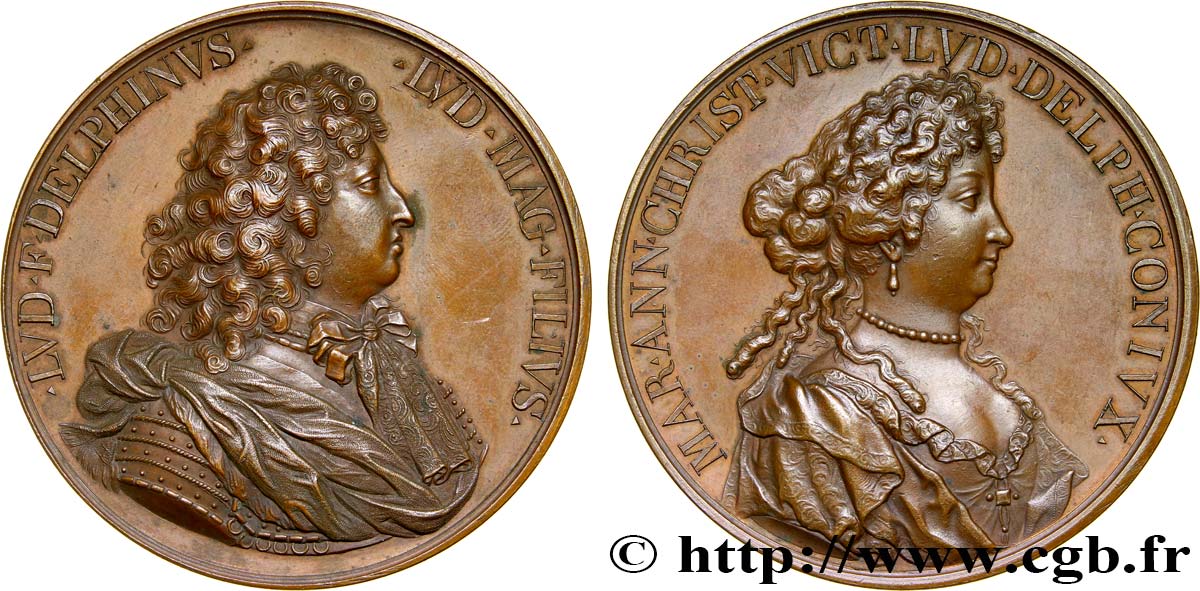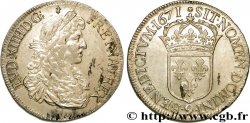- Accueil
- >
- >
fme_423545 - LOUIS XIV "THE SUN KING" Médaille de Louis le Grand dauphin et Marie-Anne
Not available.
Item sold on our e-shop (2018)
Price : 280.00 €
Item sold on our e-shop (2018)
Price : 280.00 €
Type : Médaille de Louis le Grand dauphin et Marie-Anne
Date: 1970
Mint name / Town : France
Metal : bronze
Diameter : 66 mm
Orientation dies : 12 h.
Weight : 125 g.
Edge : lisse
Coments on the condition:
Belle et intéressante médaille avec une belle patine brune
Obverse
Obverse legend : LVD. DELPHINVS - LVD. MAG. FILIVS.
Obverse description : Buste à droite du dauphin, fils de Louis XIV.
Reverse
Reverse legend : MAR. ANN. CHRIST. VICT. LVD. DELPH. CONIVX.
Reverse description : Buste à droite de la dauphine Marie-Anne-Christine-Victoire.
Commentary
Médaille de frappe ancienne, non signée, par Molard, dont une refrappe a été commercialisée dans les années 1970 par la Monnaie de Paris.
Fille de Ferdinand-Marie de Bavière et de Henriette-Adélaïde de Savoie, Marie-Anne-Christine-Victoire dite Marie-Anne ou Marie-Christine née le 28 novembre 1660 à Munich. Promise à l’héritier de la couronne de France, elle épouse le 7 mars 1680 Louis le Grand Dauphin, fils unique de Louis XIV. Le roi qui voulait un parti prestigieux pour son fils légitime unique avait envoyé à maintes reprises des ambassades pour lui faire des rapports sur la princesse de Bavière.
Louis de France, dit Monseigneur, ou le Grand Dauphin après sa mort, est né à Fontainebleau le 1er novembre 1661 et mort au château de Meudon le 14 avril 1711. Victime d’une attaque d’apoplexie (ou d'une grave indigestion, selon Saint-Simon) en 1701, il mourut de la petite vérole le 14 avril 1711 à 23 h 30, à l’âge de quarante-neuf ans, en son château vieux de Meudon, dans la chambre de son Grand Appartement. Son fils aîné, le duc de Bourgogne, ne fut finalement jamais roi car il décéda avant Louis XIV, mais le cadet Philippe fonda la maison de Bourbon en Espagne qui détient encore le trône de ce pays..
Fille de Ferdinand-Marie de Bavière et de Henriette-Adélaïde de Savoie, Marie-Anne-Christine-Victoire dite Marie-Anne ou Marie-Christine née le 28 novembre 1660 à Munich. Promise à l’héritier de la couronne de France, elle épouse le 7 mars 1680 Louis le Grand Dauphin, fils unique de Louis XIV. Le roi qui voulait un parti prestigieux pour son fils légitime unique avait envoyé à maintes reprises des ambassades pour lui faire des rapports sur la princesse de Bavière.
Louis de France, dit Monseigneur, ou le Grand Dauphin après sa mort, est né à Fontainebleau le 1er novembre 1661 et mort au château de Meudon le 14 avril 1711. Victime d’une attaque d’apoplexie (ou d'une grave indigestion, selon Saint-Simon) en 1701, il mourut de la petite vérole le 14 avril 1711 à 23 h 30, à l’âge de quarante-neuf ans, en son château vieux de Meudon, dans la chambre de son Grand Appartement. Son fils aîné, le duc de Bourgogne, ne fut finalement jamais roi car il décéda avant Louis XIV, mais le cadet Philippe fonda la maison de Bourbon en Espagne qui détient encore le trône de ce pays..








 Report a mistake
Report a mistake Print the page
Print the page Share my selection
Share my selection Ask a question
Ask a question Consign / sell
Consign / sell
 Full data
Full data



